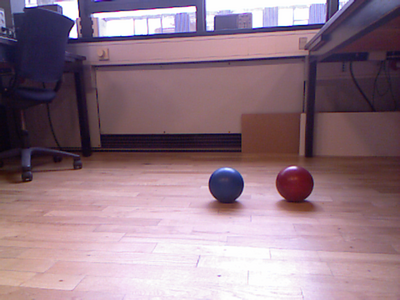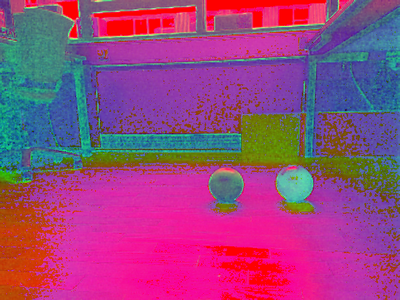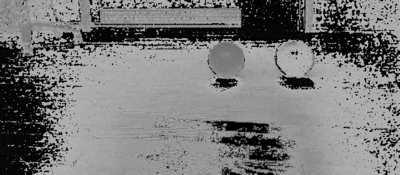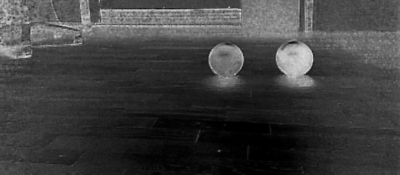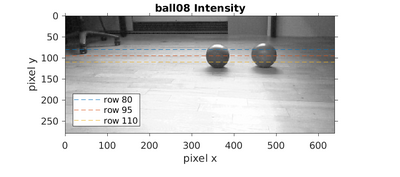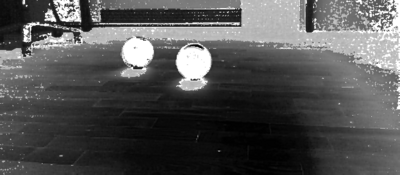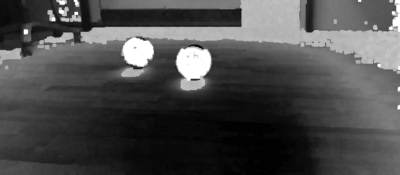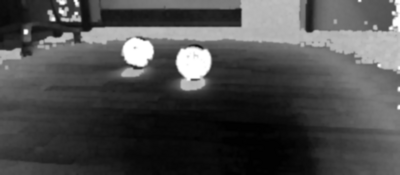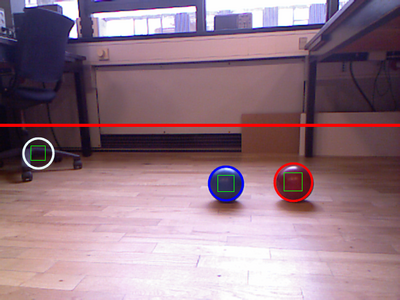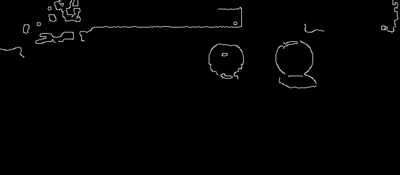Auball
(→Ball finder plugin) |
(→Hough transform) |
||
| Line 82: | Line 82: | ||
[[File:ball_5271_50_annotated.png | 400px]] | [[File:ball_5271_50_annotated.png | 400px]] | ||
| − | Figure 50. The found circles (balls?) are shown in the original image | + | Figure 50. The found circles (balls?) are shown in the original image with blue and red circles. The removed top part is shown as a red line. |
=== Canny === | === Canny === | ||
Revision as of 15:35, 11 February 2020
Back to AU Robot Servers
Contents |
Ball finder plugin
A plugin intended for finding coloured balls in a camera image. This example is an image from a Kinect camera, looking at my desk.
Figure 18. There is 2 or 3 coloured objects, 2 red in the front and a darker blue in the back.
convert to HSV
The same image in HSV format
Figure 45. A high hue value shown as blue, a high saturation in green (e.g. the dark red in the front and the blue lit in the back), the intensity (value) is shown in red (ex. the cup in the front). White objects have a hue of 0, the hue of dark objects is unreliable.
Crop
The image is cropped to the interesting Range Of Interest, here the top 100 rows are removed (parameter 'topLine').
Split into planes
The individual planes shown as grayscale images.
Figure 46. Hue, 0 is yellow (dark like the table, green is about 50 (rather dark), blue is about 115 (brighter), red is about 170 (bright). Maximum is 179, then it is back to 0.
Figure 47. Saturation, the brighter the more saturated the colour.
Figure 48. Intensity, this is a grayscale version of the original image.
Hue filtered image
The hue is used as the main filter, here emphasizing the two selected hues 'redHue=175' and 'blueHue=112'. Low saturation and low intensity are further removed.
Figure 53. A grayscale image, where all pixels with hue values of the two colours ('redHue' and 'blueHue') in the range specified by 'colLim' are set to white (255), if the hue is further away, then the highest distance from the desired hue is used. If the saturation is below 'limitSat=70' then the value is set to 0 (dark), the same if the intensity is below 'limitVal=70'.
Opening
The filtered image is likely to have smaller areas enhanced, these are removed/reduced by an opening filter.
Figure 54. Result of an opening operation with a 3x3 (all ones) erosion (twice, if 'opening=2') followed by dilation the same number of times.
Smoothing
The resulting image is then smoothed to get softer edges better suitable for a canny edge detector.
Figure 55. The smoothing is a Gauss blur with a mask size of 5 ('filter="1 5"').
Hough transform
The Hough transform is performed on the filtered image with a number of parameters ('hough="700 70 5").
The used canny filter has a high limit of 700 (and a low limit of 350 (half)). The second parameter 70 represents the voting of there is a circle with a centre at this position. The last parameter 5 is the resolution of the centre position, in this case all centre votes within 5 pixels are counted.
The Hough transform found these circles.
Hough circles found 3 circles AUBall:: 0 (268,278, 39) HSV=179 178 176 - blueish(112)= 67, redish(175)= 4 (OK=1) AUBall:: 1 (524, 58, 37) HSV=112 112 112 - blueish(112)= 0, redish(175)=-63 (OK=2) AUBall:: 2 (230,376, 38) HSV=170 171 169 - blueish(112)= 58, redish(175)= -5 (OK=1) Ball:: biggest circle at x=268.5, y=277.5, radius=38.9936, color=1 (of 3)
The numbers in brackets are pixel position and circle radius, then the HSV values and how far the hue is from the two colors. In the last bracket is the colour detection (1 for red and 2 for blue).
Figure 50. The found circles (balls?) are shown in the original image with blue and red circles. The removed top part is shown as a red line.
Canny
The Hough includes a canny edge detector, to make the image binary.
Figure 51. A replica of the Canny edge filtered image that the Hough transform uses as the basis for estimation.
Parameters
In the demo code there is a - rather high - number of parameters, these are
poolImg=28 (r/w) image pool number to use as source
poolDebugImg=45 (r/w) first image pool number to use for interim images
redHue=175 (r/w) hue value (in HSV formet) for red ball range [0-180]
(~120=red)
redCnt=2 (r) Number of red balls found in last image
blueHue=112 (r/w) hue value (in HSV formet) for blue ball range
[0-180] (~0=blue)
blueCnt=1 (r) Number of blue balls found in last image
BallSize=0.12 (r/w) Size of the ball (diameter [m])
topLine=100 (r/w) is the topmost line that could be a ball on the
floor.
size=14 80 (r/w) size limits of ball in pixels [min max]
hough=700 70 5 (r/w) params for Hough (canny high [0-1000], hough vote
[0..255], Hough resolution 1(fine)..8(rough))
colLim=13 13 (rw) Color limit (+/-) for circle center hue match [red
blue] [0..180]
mrc=1 (rw) Should result be send to MRC (smrcl)
debug=1 (rw) make more debug images and printout
filter=1 5 (rw) smooth image before detect [filter 0-1, size NxN]
opening=2 (rw) Opening before Hough circles
limitSat=70 (rw) do not use pixels with saturation lower than this
(0..255)
limitVal=70 (rw) do not use pixels with a lower V-value (intensity)
lower than this (0..255)
